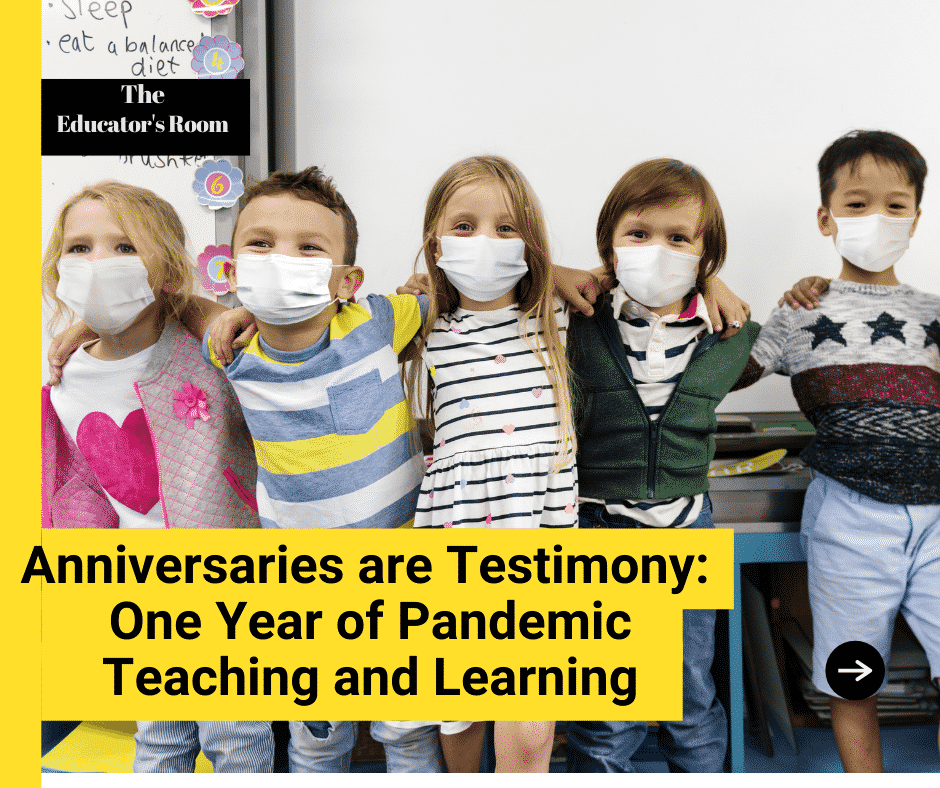One year.
Just one.
And yet, a year feels like a pivot point.
So much sacrificed, rearranged.
Discussing the turning point battles of the second world war with my students had me analyzing the impact of specific dates. I informed my classes: ‘”My grandparents want you to know the importance of December 7, 1941. Your parents want you to appreciate the significance of September 11, 2001. And, you, you will want your children to examine March 13, 2020–the day the COVID-19 pandemic ultimately changed your lives.” There were many head nods from the masked adolescents. Sighing collectively, we acknowledged our journey and recognized that it is not over.
Anniversaries are testimony–they delineate time and allow for reflection.
During the past year, we continued to “attend” school in a myriad of variations. Although many individuals claim that learning is lost with “schools closed,” even going as far as to require standardized tests, there is much evidence to the contrary. No, learning has been altered, but not lost. My students and I have learned very important lessons.
[bctt tweet=”No, learning has been altered, but not lost. My students and I have learned very important lessons. ” username=””]
Teachers and students have navigated a dizzying amount of technology. I now expertly mute my microphone when playing a video during a synchronous lesson while tuning-in to my in-person and remote pupils. With three monitors, I am like an FAA flight coordinator five times a day.
We have learned a new vocabulary. We all recognize ubiquitous phrases like “You are on mute.” “Unmute your mic.” “Turn your cameras on.” We have added words to our vernacular, like quarantine, pandemic, flattening the curve, RNA vaccinations, Pfizer, Moderna, socially distant, six feet apart, Meets, and Zooms.
The students learned about governmental mandates and are mindful of how adults complied or raged against a small piece of cloth. They watched as some areas of the country declared their rights and other sections took responsibility for others’ welfare. They watched as leaders (political, educational, and familial) modeled behavior.
While quarantined, these young people witnessed a police officer hold his knee on George Floyd’s neck for over eight minutes. The denial of humanity rippled with the ensuing protests, riots, and unrest demonstrated how past civil rights issues persist today. Teenagers, typically apathetic, took to Tik Tok to express their dismay at their inheritance. These young people took notice of our American journey. They demanded more from the adults in the room.
The children, especially the adolescents, took notes on civic engagement, forming deep political convictions.
The 2020 election became a trial of values–collectivism vs. individualism; inclusion vs. exclusion; black lives matter vs. all lives matter; police brutality vs. police protection; states’ rights vs. federalism; freedom vs. responsibility; blue vs. red; democrat vs. republican; leadership vs. ineptitude–demonstrating America’s unfinished promise.
January 6, 2021, demonstrated another rift in our fragile democratic system. We continue to digest the impact of that date; my high-school students return to those images often as evidence of our dysfunction.
Anniversaries commemorate grief and the persistence of mundane tasks required.
As “normal” life tasks recur, we have a death watch clock ticking in the background. Surreally, we accomplish household chores–carrying out the necessary survival activities–while watching the death toll climb from an unbelievable 1,000 people to a mind-numbing 500,000 and counting.
As we carry on with work and school, we often feel stuck in an existential crisis. Does any of this matter? How can the sunrise every day even though this disease has altered so much? Like any form of grief, we feel as if we are walking through thick, oozy mud. A day feels like a week, a week a year. It is March 2021, but it might also be 2031 for how the pandemic has aged us. Questions, however, remain: Did we mature? Did we grow? What will we keep? What of the “old” is obsolete?
Anniversaries mark time, measuring suffering and endurance.
I watch as the young men carry their bright orange football helmets from class to class. Their season moved from August to March has them practicing on the turf surrounded by mounds of snow. They do not care. They want to play–the seniors need a last hurrah, and the underclassmen desire to hope for the future.
My daughters’ swim season has also begun. At pick-up, I watch the happy adolescents emerge from school two by two, with their masks on and a spring in their step. It is almost like the pre-Covid days.
My hometown, Syracuse, NY, is proudly offering 24-7 vaccination appointments at the state fairgrounds. It is a testament to what people can do when given a chance to work towards a goal.
Although tired of living through historical events, this year of pandemic living has created an intimacy that shared experiences bring to people’s collective memories. The class of 2023 will forever be my Covid class–a designation never imagined but not quickly forgotten.
Anniversaries are challenging but also necessary for movement and transition.
Let’s all hope we are in a better place next year.





